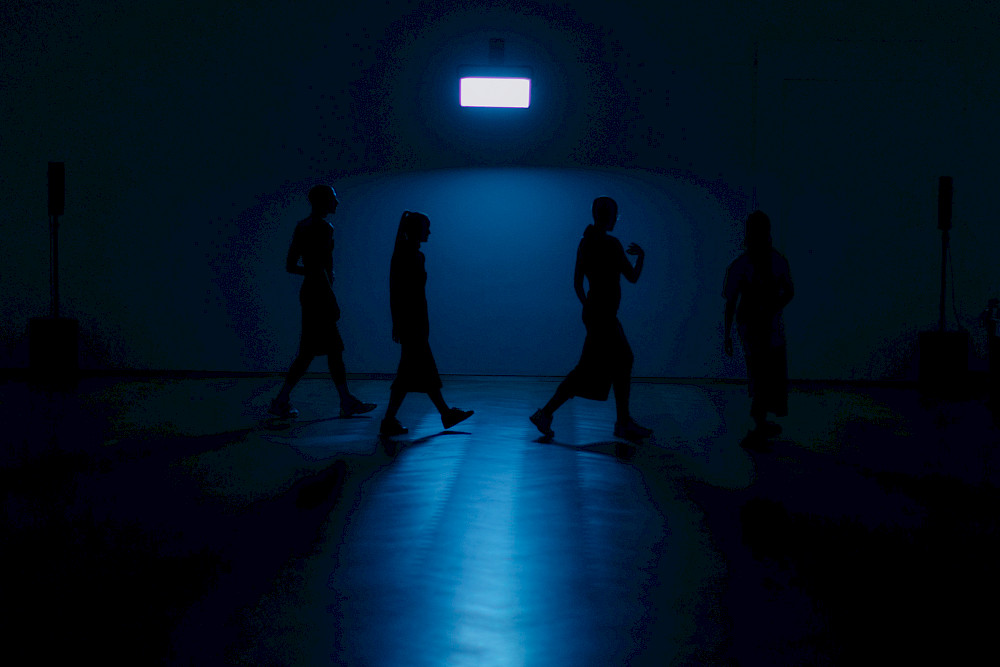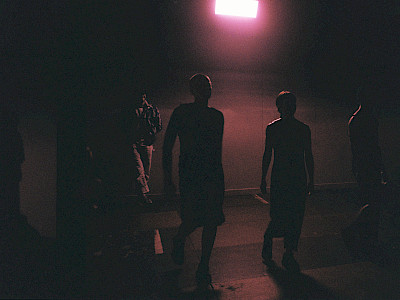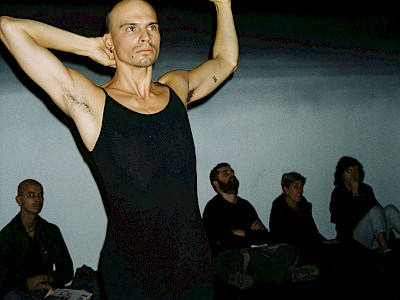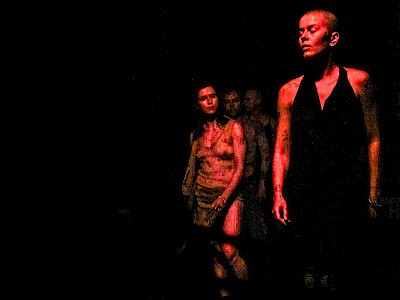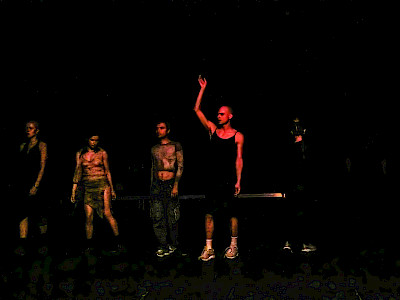26 — 29.05.2023
Alex Baczyński‑Jenkins Warsaw-Berlin
Untitled (Holding Horizon)
durational performance / dance
An empty place, a light source. Navigating between visibility and invisibility, five performers move through a subtle choreography of desire and interdependence. Alex Baczyński-Jenkins draws on gestures from the club space and the box step (a basic movement used in many dances) to create a choreography that reflects on queer desire, disorientation and collectivity. Sound and movement are in constant negotiation and generate shifting associations. The soundscape merges different references to create a layered sonic experience that includes syncopated swarms of insects, birds, love songs, experimental electronica, dance music and 70s avantgarde. Untitled (Holding Horizon) is a memory of a rave, a ghostly gathering, a celebration and mourning, a militant congregation, a pastoral fantasy. It creates a unique three-hour experience in which our own perception is distorted by time. Presented in a Brussels gym that will soon be demolished, Untitled (Holding Horizon) materialises a space for negotiating desire and amplifying the gestures, encounters and affections of a queer commons.
Queerness as a horizon of possibilities
Queerness and underground clubbing provide the starting point for Untitled (Holding Horizon) by Alex Baczyński-Jenkins. In this three-hour durational performance, dancers form and deform various groupings in the semi-darkness to box step moves. With gender-fluid outfits and bodies, and moves reminiscent of voguing, Untitled (Holding Horizon) conjures up a temporary queer club, a space where bodies can find each other and move for the duration of the encounter.
In Alex Baczyński-Jenkins’ work, longing is more of a political quest. When you know that the choreographer partly comes from Poland – a country where LGBTQ+-free zones have recently been created – this performance in an underground venue where people of any gender expression or sexual orientation can meet and let off steam becomes a direct political gesture.
There is also a deeper political strength in this durational performance. Often queerness in itself is seen as a political statement, with visibility automatically positive. Sometimes the opposite is true and a queer place or a queer piece of work are cut off from the rest of the world out of the desire to be in a safe bubble. But what exactly is queerness? Coming out of critical and performance theory of the 1990s and 2000s, is this term subject to inflation and devaluation now that it has been used and abused in mainstream contexts? If we really cherish a concept, isn’t it better to use it sparingly?
The pared back aesthetic of Untitled (Holding Horizon) also makes room for precision, for a more complex understanding of queerness. The idea of a queer identity is almost an oxymoron. Just as masculinity and femininity are categories that are performed but never quite perfectly executed, so queerness presents itself more as a horizon, a process of disrupting, twisting, wanting to remain on the margins and so consciously slipping through the gaps in the civilian net.
Untitled (Holding Horizon) is a strong example of performance theorist José Muñoz’s view that queer aesthetics are paving the way to future social relationships. It is always about a ‘not yet’, about an ideal, about a potentiality produced in the hope of stimulating an imagination for other futures. It is precisely in that ‘not yet’ that the deeper political force in this performance lies. Untitled (Holding Horizon) is not a real party, but rather the longing for a real party. It is really about keeping open a horizon in which people can live together differently, in which lives can take on other forms. The nightclub represents par excellence the underground scene: its bars, clubs and cruising spots where bodies meet in the semi-darkness to the beats of minimal techno and house. This private party, the duration and endurance of which make it clear that it is not just a casual gathering, is like a dark mirror of public, grand and increasingly commercialised prides. Is this the seed of a larger parade or rather a return to the disruptive core, away from commerce and stereotypes?
This performance can also be interpreted in terms of what philosopher Judith Butler described in her Notes Toward a Performative Theory of Assembly. Gatherings, she writes, “strive for modes of life in which performative acts struggle against precarity, a struggle that opens up a future in which we might live in new social modes of existence, sometimes on the critical edge of the recognizable, and sometimes in the limelight of the dominant media – but in either case, or in the spectrum between, there is a collective acting without a pre-established collective subject; rather, the ‘we’ is enacted by the assembly of bodies, plural, persisting, acting, and laying claim to a public sphere by which one has been abandoned.” Here Butler is mainly referring to protest movements, but I think they can take many more forms than the typical street manifestations. There are many types of ‘performative acts’, not only on streets and squares, but also in semi-public or less mediatised and visible places where people come together, such as in the semi-darkness of a club or theatre.
What also resonates with the party performances inspired by queer nightlife is the utopian search for new social forms of life. The more nuanced works that waver between visible and invisible, such as those by Baczyński-Jenkins, suggest that it can sometimes be difficult not only for LGBTQ+ communities, but for the sense of ‘community’ itself. According to Butler’s excerpt, what is ‘abandoned’ in times of mediatised and polemical neoliberalism is the social self. So it largely goes beyond a question of queerness: a space where bodies can find each other and where a non-predetermined ‘we’ can unfold is more universal than that.
Therefore, despite the underground vibe, Untitled (Holding Horizon) does not feel exclusive. Quite the opposite; there is something open and inviting about the choreography. It generates a space where you can stand, lie down and move with ease, while bathing in the atmosphere created by music and light.
However, as Muñoz also suggested, we must remember that queerness, like utopias, is doomed to failure: misfortune and the courage of despair also shine through in this performance. The choreographer seems aware of the fact that it is just a performance, a horizon, a theoretical future that opens up for the duration of the performance, but then closes again. The austere, simple form, the continuous semi-darkness, the box-step choreography that goes on and on without finding a moment’s rest: it suggests that we are watching something that cannot or will not take place – at least not yet – in broad daylight, and thus continues to take place in the semi-darkness on the horizon. Using the venue to create a situation of exception is therefore a precondition for seeking out that political, social potential that allows you to think about utopia. Owing to its isolated position, everything is by definition finite and ‘utopian’ in the sense of being unreal.
Party performances contain a paradox or at least an inescapable aspect: the relationship between utopia and practice. How do you transpose into a broader social reality the status of a performance that takes an audience into a concentrated form isolated in time and space? Does staging a community in its partying form automatically mean taking a step towards its emancipation or liberation? As the performance is utopian, it becomes a bit like a theory versus the practice of life. What might the relationship look like between theory and practice, between the performance and life, between the nightclub and the next day? Perhaps this brings us back to the age-old question of the politics of theatre. Jill Dolan wrote of utopian spectacles and parties that this feeling of utopia is not spread over the entire evening or night, but rather is like a flash when you feel that everything can change. I cannot get rid of the impression that, just like in Untitled (Holding Horizon), this political aspect is not so much in the partying communities being represented, but rather in a fundamental sense of belonging, of a possible social bond. Because this bond is more broken than it seems. Perhaps this is the essence of the party performance with its focus on fun and togetherness: it seeks to create moments when shared pleasure becomes a source of energy that will allow utopian horizons to continue to be examined, animated by the courage of hope.
Excerpt from “Een dramaturgie van verlangen: Wat is het transformatieve potentieel van feestvoorstellingen?” [“A dramaturgy of desire: What is the transformative potential of party performances?”] by Kristof van Baarle, published
in Etcetera 171, March 2023.
*A durational performance is one that employs duration and the passage of time. Witnessing the full experience is recommended, but you can freely leave and re-enter if necessary
Presentation: Kunstenfestivaldesarts, City of Brussels
Choreography: Alex Baczyński-Jenkins | In collaboration with and performed by: Aaa Biczysko, Arad Inbar (26-27.05), Ewa Dziarnowska (28-29.05), Rafał Pierzyński, Ronald Berger, Sigrid Stigsdatter | Developed with: Aaa Biczysko, Rafał Pierzyński, Sigrid Stigsdatter, Tiran Normanson | Production manager: Ola Knychalska | Live sound and lighting: Krzysztof Bagiński | Sound research: Jana Androsova, Krzysztof Bagiński, Tobias Koch, Filip Lech | Styling advice: Rafał Domagła | Studio director: Andrea Rodrigo | Studio manager: Sarie Nijboer | Distribution: Something Great
Developed as part of Kem's residency at the Ujazdowski Castle Center for Contemporary Art, Warsaw
Originally commissioned for the 2018 Frieze Artist Award, in partnership with Delfina Foundation, and presented as part of Frieze Projects, curated by Diana Campbell Betancourt
Performances in Brussels with the support of the Polish Institute Brussels
